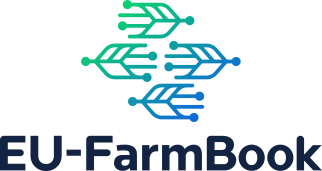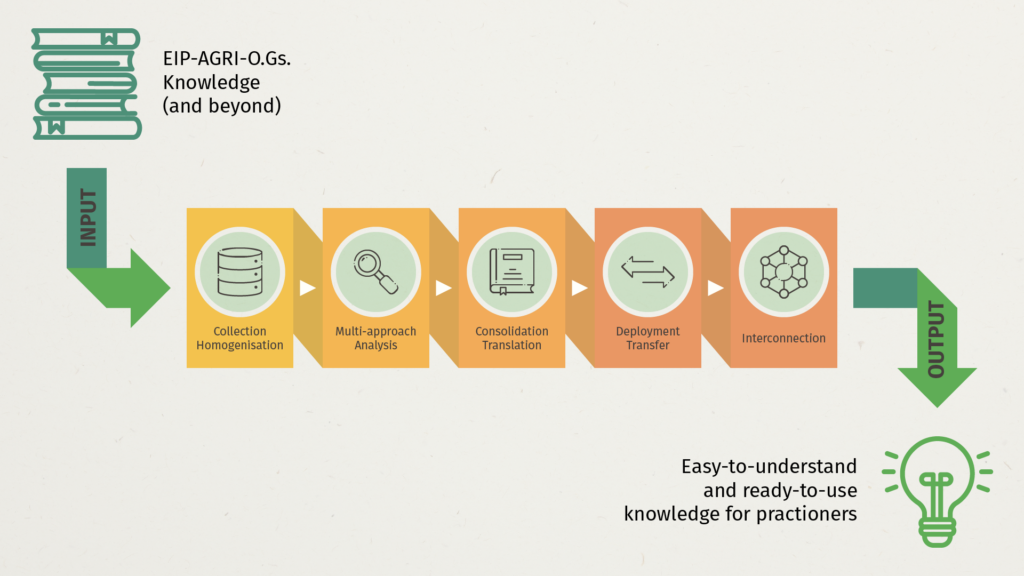About NUTRI-KNOW
Our approach
In the past, a great amount of knowledge on managing choices in the primary sector has been developed by many EU funded scientific projects. However, despite the continuous flow of knowledge about innovative technologies, products, tools and recommendations in the agri-food sector, new or improved managing choices and best practices have not been appropriated by practitioners as expected.
NUTRI-KNOW aims to improve nutrient management practices in agriculture by gathering and sharing knowledge from multiple EIP-AGRI (European Innovation Partnership for Agricultural Productivity and Sustainability) Operational Groups from four EU member states. These projects group farmers and other stakeholders to develop and implement innovative solutions to practical problems in the agricultural sector.
NUTRI-KNOW seeks to capitalise this knowledge of the EIP-AGRI OGs in the field of nutrient management through practice-oriented information for farmers and practitioners.
Our goals and impact
NUTRI-KNOW also aims to create a platform and thematic network for collecting, providing, and exchanging information on agriculture. This platform seeks to connect stakeholders, strengthen knowledge flows, and deliver knowledge. The overall goal of the project is to create more value for a sustainable agricultural sector, reduce reliance on imported mineral fertilisers, and improve the lives of farmers through better practices and access to information.
Eventually, the focus is to reduce the dependency on chemical fertilisers, to better use organic manures, and to increase efficient nutrient management.
Related projects

BBioNets
BBioNets is a thematic network that relies on, promotes and further advances the work carried out by EIP-AGRI Operational Groups (OGs) with respect to the management and/or processing of agricultural and forest biomass with BBTs. Its objective is to incite primary producers all over Europe to embrace and adopt BBTs that will enable them to reduce GHG emissions, make better use of underutilised biomass, create new diversified incomes, reduce costs through circular practices, increase farm/forest sustainable management, and create/develop new value chains.

NENUPHAR
NENUPHAR aims at developing governance and value chain solutions that target three widespread waste streams in the EU: manure, sewage sludges, and dairy wastewaters. It introduces four key innovations: a methodology for estimating N/P emissions, new governance models, innovative economic incentives, and enabling technologies to recover the nutrient loads. NENUPHAR's approach will be demonstrated in diverse river basins and replicated in insular systems, potentially recovering significant amounts of nitrogen and phosphorus.

PRIMED
PRIMED will co-create innovative forms of cooperation to integrate primary producers in novel bioeconomy value chains with a multi-actor approach. To do so, PRIMED will develop new Circular Business Models in Bioeconomy (CBMB) to produce high-value biobased products through advanced biorefineries and will demonstrate them in five Living Labs (LLab). PRIMED will also empower multi-actors to co-design a collaborative ecosystem to accelerate the bioeconomy, with an Open Access knowledge hub and toolkit (PRIMED digital toolbox).

EU-FarmBook
EU-FarmBook is a Horizon Europe initiative designed to create an online platform that consolidates and shares agricultural and forestry knowledge across Europe. This project aims to address the challenges of data quality, compatibility, and language barriers by providing a user-friendly interface that makes research outcomes accessible to farmers, foresters, and advisors. The platform serves as an interactive meeting place for stakeholders, facilitating innovative solutions to everyday challenges in agriculture and forestry while promoting practical communication and educational outreach.

SMART4ENV
SMART4ENV aims to improve TUBITAK MAM R&I capacities to strengthen its scientific reputation, attractiveness and networking channels while stimulating scientific excellence in key applications of Smart Environmental Solutions (SES) for the mitigation and adaptation to climate change in water, agriculture, and public health sectors. The project will develop capacity building and training of both permanent scientists, Early-Stage Researchers (ESR); enlarge cooperation between academia, industry, and stakeholders in Turkey with a sustainable framework for research, international networking, mobility, and integration in the European Research Area.

SYMBA
The SYMBA project aims at creating a new and innovative Industrial Symbiosis (IS) methodology to be replicated within EU according to the local/regional bio-based industrial ecosystem. SYMBA will implement a user-friendly and accessible AI database suggesting regional IS innovative processes to create zero-waste value chains, ensuring more local supply chains, a better distribution of economic and social benefits among the stakeholders and an increase in the economic value of final products.

NUTRI-CHECK NET
NUTRI-CHECK NET aims to establish a self-sustaining, multi-actor, Thematic Network that builds farm-level adoption of best field-specific nutrient management practices across Europe. In nine countries farmers’ Crop Nutrition Clubs (CNC) will identify and share the nature of their uncertainties about crop nutrition, their challenges and barriers to change. Decision-systems and nutrition tools (including commercial products, services, and recent research outputs) will be assembled by national experts from across Europe, including leading farmers, into a common online NUTRI-CHECK NET platform. CNCs will then evaluate the effectiveness of new protocols and tools selected from the toolbox to meet their main challenges. Initial and final evaluations will be shared across the Network to define ‘best practices’, which will be demonstrated and disseminated widely, including through liaison with other relevant Thematic Networks and EIP-AGRI.
